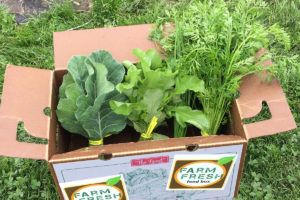By Seth Truscott, College of Agricultural, Human and Natural Resource Sciences
Full of leafy greens and hearty root vegetables, a food box program piloted by Washington State University Extension is helping Northwest Washington families eat more nutritious meals, while giving rural farms and retailers a healthier economic base.
In extension’s new Farm Fresh Food Box project (F3B), rural residents have the option of ordering weekly boxes of freshly harvested produce, delivered by local farms in partnership with small retailers.
“It’s a gateway box,” explains Diane Smith, a food access specialist with WSU’s Skagit County Extension. “With F3B, we’re learning how to affordably bring more healthy foods to rural Washington families and increase value to farmers and rural retailers.”
F3B marks a multistate research and extension effort, led by researchers at the University of Vermont, with partners at University of California Cooperative Extension and The Evergreen State College. F3B is being tested in California and Vermont, as well as Washington’s Skagit County. In short, F3B helps people access farm-fresh produce more conveniently.
Extension surveys have shown that Washington residents of all incomes want more fruits and vegetables in their diets, but many find the cost too high.
“F3B gives families an affordable entry point,” said Smith. “They’re becoming more familiar with their local farmers, while getting seasonal produce at the peak of freshness.”

Farm Fresh Food Boxes range from $12 to $20, and there’s no weekly commitment. Small rural retailers, who may not always carry a full range of fresh fruits and vegetables, post a list of the produce coming in each week’s box, and residents have the option of signing up for that week’s delivery.
By partnering with local retailers through F3B, farms find new venues to sell their produce, while retailers see increased visits by shoppers. Retailers also receive a 10 percent cut of the cost of the box “as a way of honoring their part in our food system,” Smith said.
At Concrete, Washington, Smith paired Blue Heron Farm with 5b’s Bakery, while in Bow, Washington, Well Fed Farms took its boxes to local grocer WD Foods. At Mount Vernon, Waxwing Farm partnered with a nearby tacqueria, Mi Cocina.
“Rural communities can sometimes be ‘food deserts,’” says Smith. “With F3B, we’re increasing access to fruit and vegetables and building connections with the farmers who grow our food. We’re turning food deserts into oases for better health.”
To learn more about the Farm Fresh Food Box program, contact Diane Smith, WSU Extension food access specialist, at 360‑428‑4270, ext. 235, or diane.smith@wsu.edu.






